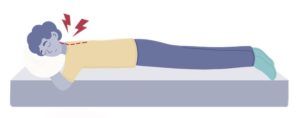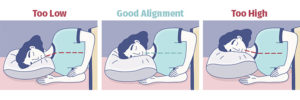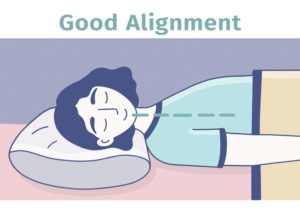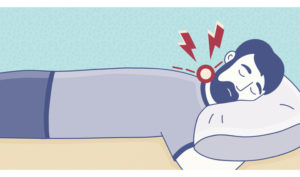When you can’t sleep because of shoulder or neck pain, it can be frustrating, especially when you can’t figure out the cause of your pain.
Some pain-related issues, like joint pain from overuse or injuries, don’t always have the easiest fixes. But for some people, a simple fix like sleeping on the best mattress for neck and shoulder pain, adjusting your sleeping position, or changing out your pillow could be enough to help alleviate your pain.
We’ve put together expert advice on how to sleep with neck and shoulder pain, including some quick tips on changes you can make in your own bedroom.
[Editor’s Note: The information provided should not be considered a substitute for professional advice. Please consult a sleep doctor or other medical expert if you have questions related to your own health.]
What’s Causing Your Shoulder or Neck Pain?
When you think about how much work your neck does in even the simplest of actions, it’s no surprise that so many people suffer from pain in the neck muscles and shoulder muscles. In fact, even something as simple as the way you look at your phone could be the cause of your neck pain.
Some of the common causes of neck and shoulder pain include:
- Injury from overuse
- Worn joints from conditions like osteoarthritis
- Pinched nerves
- Sleeping incorrectly in a bad sleeping position
- Sleeping on the wrong mattress
- Sleeping on the wrong pillow
How Your Sleeping Position Can Worsen Your Pain
One of the big culprits of your neck or shoulder pain could be your sleeping position. Ideally, you should sleep on your back or side to avoid neck pain.
Stomach sleeping is the worst sleeping position for people who have neck pain since this position already puts a lot of strain on the neck and lower back, especially if you also use a thick pillow.
For sleepers with shoulder pain, it’s best to avoid sleeping on your side, especially the side that you have the most pain on. Back sleeping will be more comfortable for people who have shoulder pain. Just be sure to sleep with your arms relaxed to your side on your chest or on your abdomen. If you sleep with your arms up above your head, this may end up worsening your shoulder pain.
How Your Mattress Or Pillow Can Worsen Your Pain
Sleeping on the wrong mattress or pillow could also contribute to your pain, especially for sleepers with shoulder pain. When it comes to neck pain, your pillow is going to play a bigger role in your comfort level since the main purpose of a pillow is to support your head and keep your neck in neutral alignment.
Sleepers with shoulder pain should be extra wary of their mattress choice, especially for those who are side sleepers. To avoid exacerbating your shoulder pain, you will want to make sure you have a mattress that isn’t too soft or too firm. If a mattress is too soft, you could sink too far into it and experience pain from bottoming-out onto the firm base layer.
On the other hand, if a mattress is too firm, you won’t be able to sink in enough and will feel pressure build up in your shoulders.
Fortunately neck pain from common pains & strains, poor posture, overuse and incorrect sleeping positions can be treated at home, with many options to improve your sleep experience.
5 Tips for Avoiding Neck or Shoulder Pain While Sleeping
Understanding how you sleep is important in alleviating shoulder or neck pain. Combating neck and shoulder pain while you sleep involves a few different factors—your sleeping position, the right pillow and mattress, practicing gentle stretches before bed, and practicing healthy posture habits during the day can all work to improve your sleeping experience.
1. Change Your Sleeping Position
Did you know that there are some sleeping positions that are considered healthier than others? Health experts say back sleeping is the best sleeping position above all others.
This is because sleeping on your back helps your head, neck, and spine stay in neutral alignment – which is absolutely key to reducing your chances of neck (or back) pain at night.
So what does that mean for the other sleeping positions? If you’re a side sleeper experiencing shoulder or pain, you may need to train yourself out of that position.
Side sleepers put a lot of pressure on their shoulders and other pressure points like the hips and knees while they sleep. All hope is not lost for side sleepers though!
If you sleep on a contouring and supportive mattress that cradles the shoulders (paired with the right pillow), you may be able to get away with staying in this position pain-free. Check out our list of the best mattresses for side sleepers to make sure you have a mattress that properly supports this position.
However, if you aren’t ready to purchase a new mattress or pillow and are experiencing shoulder pain, avoid sleeping on the affected side. If possible, sleep on the opposite side and place a pillow between your knees for added comfort and to help maintain a good sleep posture.
What about stomach sleepers? Stomach sleepers aren’t in danger of putting direct pressure on the shoulders; however, stomach sleeping can be dangerous and harmful to the neck (especially if you sleep with a thick pillow).
If you’re having trouble sleeping with neck or shoulder pain, switching your sleeping position over to your back may be enough to alleviate your pain. Of course, it’s not always that simple. Another important factor is sleeping on bedding products that support proper alignment.
2. Choose a Supportive Mattress
A supportive mattress can go a long way in keeping you comfortable and in proper alignment while you sleep. The kind of support you need from a mattress has a lot to do with your body type and your sleeping position.
| Body Type | Sleeping Position | Recommended Mattress Type |
| Lightweight | <Side | Softer |
| Lightweight | Stomach or Back | Medium |
| Average | Side | Medium to medium-firm |
| Average | Stomach or Back | >Medium-firm |
| Heavy | Side | Medium-firm to firm |
| Heavy | Stomach or Back | Firm |
Lightweight sleepers are typically best supported on softer mattresses, while heavier people (200+ pounds) need a firmer mattress to offer the best support.
Side sleepers need softer mattresses that contour to their body to alleviate pressure in the hips and shoulders, while back and stomach sleepers need a more firm mattress to keep their spine aligned.
3. Pick A Supportive Pillow
Picking the right pillow might just be the solution to your persistent pain. The most important thing is keeping your neck and spine aligned, based on your sleeping position.
“A good sleeping posture is key to sleeping soundly, night after night, and to waking without pain and stiffness,” says Dr. Michael Breus, a clinical psychologist and noted sleep expert in a blog post on his website. “Your pillow helps to support a healthy sleep posture.”
So how do you choose the best pillow for you?
Your height, weight, and personal preferences will help determine what pillow you ultimately choose, but here are some general guidelines based on your sleeping position:
- Side sleepers typically need the thickest/firmest pillow because they need to support their head and neck so that it lays in the middle of the shoulders. A rounded pillow may be a good choice for side sleepers to have high support around the neck and lower under the head.
- Back sleepers need flatter pillows that support the natural curvature of the neck and spine and promote a neutral alignment.
- Lastly, stomach sleepers would benefit from pillows no more than 3″ in height, or they risk putting additional strain on their neck (which can result in neck pain).
When looking at the materials of pillows, feather pillows and memory foam pillows can provide the support and comfort to help reduce your neck pain.
Overall, try to avoid a very stiff or high pillow. This can force the neck to remain flexed while your sleep and lead to additional neck pain.
Read our guide on the best pillows for neck pain for an extensive list of choices.
4. Practice Gentle Stretches
You can also do a few simple exercises to relieve neck pain and work toward a better night’s sleep. Depending on your particular medical situations, some experts will recommend gentle stretching of either your neck or your shoulder before heading to bed.
Stretching your neck loosens your tight muscles and may help relieve your pain, according to experts from Spine-Health.com. There are different types of stretches depending on where the pain is located in your neck. It may be best to consult with a medical professional before trying any specific stretching to make sure you’re loosening the right muscles and not potentially making things worse.
The professionals at Restore Orthopedics and Spine Center in Orange, California, say that they often hear common complaints about shoulder pain keeping people awake at night. One suggestion they frequently make is to stretch the shoulder.
“In my experience, once the flexibility or range of motion (ROM) of [the] shoulder is optimized the pain improves,” wrote Dr. Steve Mora, an Orange County Shoulder Specialist at Restore, in a blog post on the company’s website. “In cases where the pain is caused by inflammation, such as tendinitis or bursitis, the night time pain may permanently resolve.”
5. Practice Healthy Posture Habits
If you find yourself looking down at a phone or computer for most of the work day, make these simple adjustments to stop neck or shoulder pain before you go to sleep.
- Use good posture with shoulders in line with your hips and ears sitting directly above your shoulders.
- Take breaks throughout the day to stretch by rolling your shoulders backwards 10 times, squeezing shoulder blades together 10 times and bringing your eye to your shoulder 10 times.
- Keep your computer monitor at eye level by adjusting your desk and chair as needed.
- Avoid using your phone in bed. Experts say this causes undue stress to your neck.
Summary
There are many reasons for neck or shoulder pain – some are out of our control and others can be fixed with the change of a pillow or mattress.
Improve your sleep by adjusting your sleep position, picking out the right mattress and pillow pillow, and adding in simple changes to your everyday routine.
[Editor’s Note: The information provided should not be considered a substitute for professional advice. Please consult a sleep doctor or other medical expert if you have questions related to your own health.]
Featured image: Dusan Petkovic






